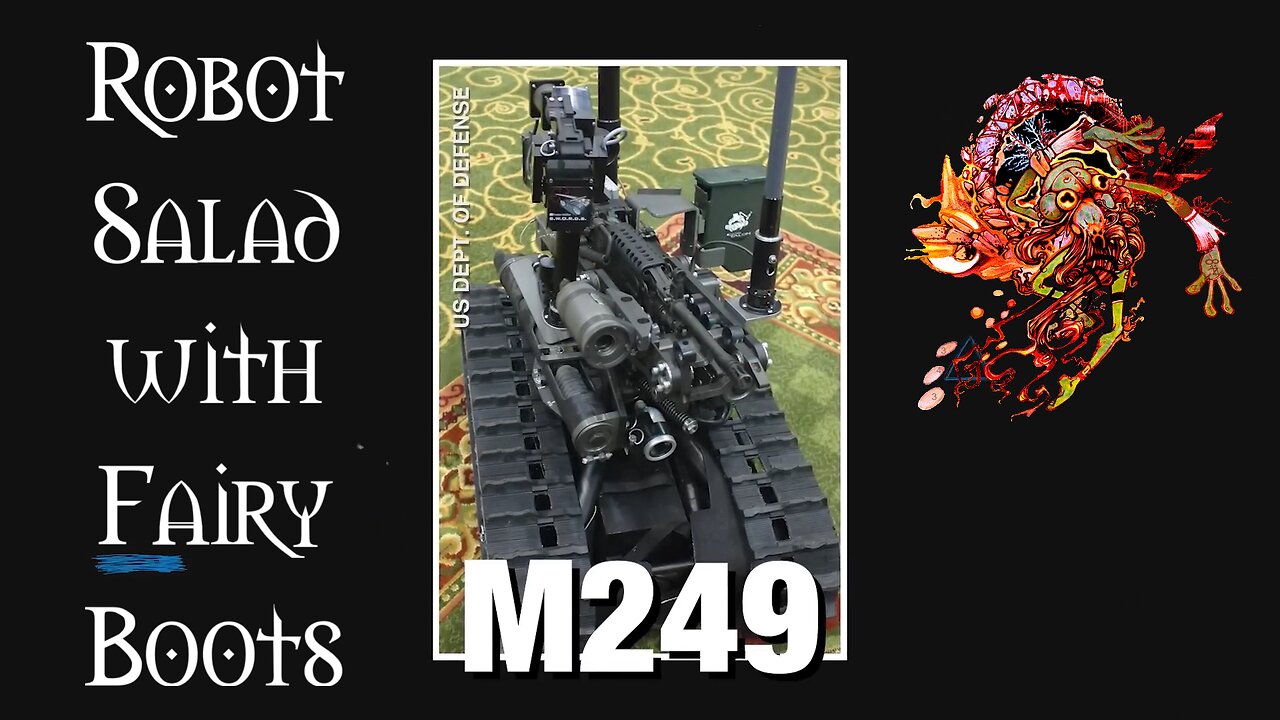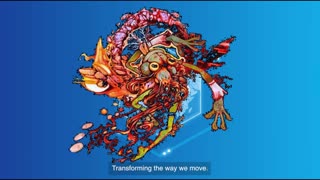Premium Only Content

Robot Salad with Fairy Boots
The Three Laws of Robotics (often shortened to The Three Laws or known as Asimov's Laws) are a set of rules devised by science fiction author Isaac Asimov. The rules were introduced in his 1942 short story "Runaround" (included in the 1950 collection I, Robot), although they had been foreshadowed in some earlier stories. The Three Laws, quoted from the "Handbook of Robotics, 56th Edition, 2058 A.D.", are:
First Law A robot may not injure a human being or, through inaction, allow a human being to come to harm. Second Law A robot must obey the orders given it by human beings except where such orders would conflict with the First Law. Third Law A robot must protect its own existence as long as such protection does not conflict with the First or Second Law.
These form an organizing principle and unifying theme for Asimov's robotic-based fiction, appearing in his Robot series, the stories linked to it, and his Lucky Starr series of young-adult fiction. The Laws are incorporated into almost all of the positronic robots appearing in his fiction, and cannot be bypassed, being intended as a safety feature. Many of Asimov's robot-focused stories involve robots behaving in unusual and counter-intuitive ways as an unintended consequence of how the robot applies the Three Laws to the situation in which it finds itself. Other authors working in Asimov's fictional universe have adopted them and references, often parodic, appear throughout science fiction as well as in other genres.
The original laws have been altered and elaborated on by Asimov and other authors. Asimov himself made slight modifications to the first three in various books and short stories to further develop how robots would interact with humans and each other. In later fiction where robots had taken responsibility for government of whole planets and human civilizations, Asimov also added a fourth, or zeroth law, to precede the others:
Zeroth Law A robot may not harm humanity, or, by inaction, allow humanity to come to harm. The Three Laws, and the zeroth, have pervaded science fiction and are referred to in many books, films, and other media. They have affected thought on ethics of artificial intelligence as well.
Paranoid is the second studio album by English heavy metal band Black Sabbath, released in September 1970 through Vertigo Records in England and Warner Bros. Records in the US. The album contains several of the band's signature songs, including "Iron Man", "War Pigs" and the title track, which was the band's only Top 20 hit, reaching number 4 in the UK charts.
In a 2017 publication by Rolling Stone magazine, Paranoid was ranked number one on its list of the "100 Greatest Metal Albums of All Time". The album is often cited a key influence for the development of the heavy metal music genre as well as one of the earliest heavy metal albums. Paranoid was the band's only album to top the UK Albums Chart until the release of 13 in 2013.
In an effort to capitalize on the recent UK chart success of their eponymous debut album, Black Sabbath returned to the studio with producer Rodger Bain in June 1970, just four months after the album was released. Paranoid was recorded at Regent Sound Studios and Island Studios in London, England.
The album's title track was written as an afterthought. As drummer Bill Ward explains: "We didn't have enough songs for the album, and Tony (Iommi) just played the guitar lick and that was it. It took twenty, twenty-five minutes from top to bottom." In the liner notes to the 1998 live album Reunion, bassist Geezer Butler recounts to Phil Alexander that they wrote the song "in five minutes, then I sat down and wrote the lyrics as quickly as I could. It was all done in about two hours." According to Alexander, "Paranoid" "crystallized the band's writing process, with Iommi initiating the ideas with his charred riffs, Ozzy (Osbourne) working on a melody, Geezer providing drive and the majority of the lyrics, and Bill Ward locking into a set of often pounding rhythms beneath Butler's bass rumble." The single was released in August 1970 and reached number four on the UK charts, remaining Black Sabbath's only top ten hit.
Most of the songs on Paranoid evolved during onstage improvisational jams. In the Classic Albums documentary on the making of Paranoid, guitarist Tony Iommi recalls that "War Pigs" came from "one of the clubs" with Butler adding, "During the song "Warning" we used to jam that out and that particular night when we were jamming it out Tony just went da-dum!" In the same documentary, Iommi demonstrates his approach to the guitar solo in the song, explaining that "I always tried to keep the bottom string ringing so it fills it out nicely." On "Planet Caravan", Osbourne sings through a Leslie speaker, with the singer telling Mojo in 2010, "Then Rodger Bain used an oscillator on it – whatever that is. It looks like a fridge with a knob on."
According to Butler, Ward's drum solo "Rat Salad" resulted from the band having to play 8 and 3/4-hour spots a night in Europe early in their career. "Bill used to fill out a whole 45 minutes doing a drum solo just to get rid of that 45 minutes," he revealed to Classic Albums. "I have no idea where the title came from, though." While Butler may have now forgotten where the title of "Rat Salad" came from, in 1971 he was on record stating it came from a joke about Ward's hair having not been combed.
In 2013, Sabbath biographer Mick Wall described the closing track on the album, "Fairies Wear Boots", as a "hard-driving riff sweetened by a beautifully baleful melody" with a lyric written by Osbourne about a nasty encounter with a group of skinheads.
-
 10:33
10:33
Psychological operations
6 days agoThe Wizard Fairies Wear Boots Black Sabbath
32 -
 1:28:41
1:28:41
Graham Allen
3 hours agoSenate Is STALLING ALL Trump Nominations!! + Is Trump Going After The Bidens?!
64.5K69 -
 4:56
4:56
Tactical Advisor
1 hour agoPSA X5.7 Update | Shot Show 2025
1 -
![🔴[LIVE TRADING] Trump Addresses WEF || The MK Show](https://1a-1791.com/video/fwe1/84/s8/1/B/k/0/3/Bk03w.0kob.5-small-LIVE-TRADING-New-Highs-Inco.jpg) LIVE
LIVE
Matt Kohrs
9 hours ago🔴[LIVE TRADING] Trump Addresses WEF || The MK Show
1,587 watching -
 34:27
34:27
Rethinking the Dollar
49 minutes agoThursday Morning Check-In: Trump Backlash & DOGE Savings Added To Debt Clock
-
 33:37
33:37
BonginoReport
5 hours agoGen Z Commies Are Plotting Violent Revolution Against Trump (Ep.124) - 01/23/2025
51.6K111 -
 LIVE
LIVE
Vigilant News Network
11 hours agoElon ATTACKS Stargate Project.. Is he RIGHT? | The Daily Dose
909 watching -
 1:05:34
1:05:34
2 MIKES LIVE
2 hours agoTHE MIKE SCHWARTZ SHOW with DR. MICHAEL J SCHWARTZ 01-23-2025
8.21K -
 1:31:27
1:31:27
Film Threat
16 hours agoLIVE OSCAR NOMINATIONS 2025 REACTION! HOLLYWOOD ON FIRE? | Academy Awards | Film Threat Awards
24.1K1 -
 1:23:45
1:23:45
Game On!
15 hours ago $3.28 earnedTom Brady critical of Patrick Mahomes abusing NFL sliding rules!
41K5